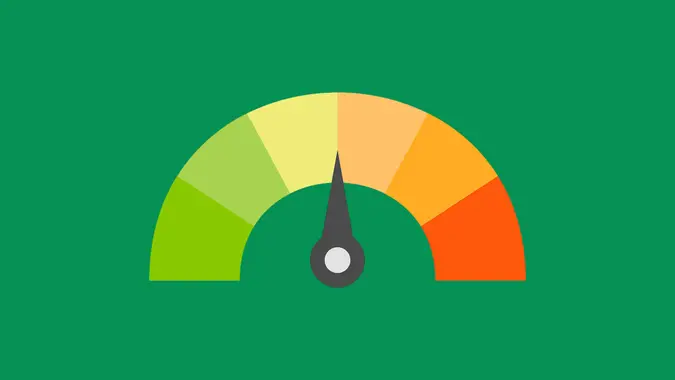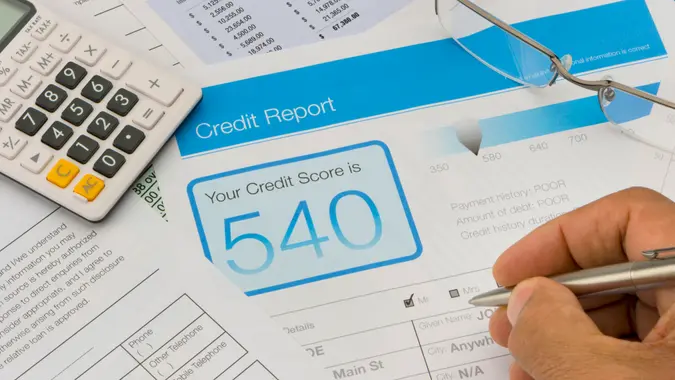How To Negotiate With Credit Card Companies

Commitment to Our Readers
GOBankingRates' editorial team is committed to bringing you unbiased reviews and information. We use data-driven methodologies to evaluate financial products and services - our reviews and ratings are not influenced by advertisers. You can read more about our editorial guidelines and our products and services review methodology.

20 Years
Helping You Live Richer

Reviewed
by Experts

Trusted by
Millions of Readers
If you’re struggling with high interest rates or mounting credit card debt, learning how to negotiate with credit card companies can help you save money and regain control of your finances. Many people don’t realize that credit card issuers are often willing to work with customers — whether it’s lowering your interest rate, waiving fees or setting up a manageable payment plan.
The key to successful negotiation is knowing what to ask for and how to present your case. By understanding your financial standing, being prepared with the right information and approaching the conversation strategically, you can improve your credit terms and reduce your debt burden.
Here’s how to get started:
Why You Might Need to Negotiate with Your Credit Card Company
A little less than half of credit card holders (47%) carry a balance on their account for at least one month. One in three Americans also face delinquent debt. If that overdue debt is with your credit card company, there are ways to ask for help.
Make certain you review your credit card debt to see where you stand. Remember, asking for better terms can save you several thousand dollars.
You feel like you’re trying to keep up with your credit card payments, but you’re barely able to make the minimum payment. This may be a sign to reevaluate how you approach your credit card. You may want to negotiate with your credit card company in the following situations:
Struggle to Make Payments: It’s too hard to keep up with monthly payments and you want to work out a plan.
The Interest Rate is Too High: It is a good idea to periodically call the credit card company to secure a lower interest rate (even if you aren’t having trouble making payments). Credit card companies will consider a lower interest rate if you’re in good standing and have been a long-time customer.
Remove Late Fees: If you’re a good customer and have never been late on a payment or had only a few instances of being late, you could call to get a late fee removed.
Want a Debt Plan: If you want to settle a large balance for less than what you owe, it’s a good time to call your credit card company.
When Is the Best Time to Negotiate?
There is an ideal time to negotiate your credit card terms. If you notice that you can make the next few payments but may be in danger of missing payments in the future, call when you’re current with your bill. Companies may be more willing to help at this point.
If you suffer a job loss or have mounting medical bills, as soon as you feel like your credit card payment is an additional hardship, call the credit card company. Many have hardship programs.
If you’ve checked your credit recently and noticed that it has improved, call to negotiate a lower interest rate.
Also, you have more negotiating power before your account goes into collections. It’s easier to deal directly with your credit card company than with a third-party vendor who’s responsible for collections on severely delinquent accounts.
What Can You Negotiate?
You may think that credit card companies are unable to budge on their terms. These companies will be willing to negotiate with you because some payment is better than a complete default. Be firm but polite, and explain why you need help.
Some possible areas of what you can negotiate center on the following:
Interest Rates
If you have a high interest rate, it’s crucial to try to secure a lower interest rate to save money. Call the credit card company and see what they are willing to do.
Don’t be afraid to ask because paying a lower interest rate means more of your money will chip away at the principal amount.
Late Fees
Credit card companies will typically remove late fees (which can be $30 and higher) from your account. If you are usually timely with your payments, the credit card company can access that history and have late fees removed.
Payment Plan
Explain to the credit card company the reason for your struggle in making your monthly payments. Let them know you are willing to make payments, but need a payment plan to reflect your current financial situation.
Debt Settlement
If you’re already behind, you can propose a lump sum amount to pay off the total owed. Typically this lump sum payment is lower than the amount you owe. Credit card companies have an incentive to take the lump sum because they don’t want to miss out on getting paid.
How to Prepare Before You Call
Before making the call to the credit card company, it’s a good idea to be prepared. You should be able to clearly explain why you’re asking for help. Let the representative know if you’ve had a medical emergency or you’ve suffered a job loss.
Here are the other key things you should be prepared to talk about:
- Know your account details including current balance, interest rate and payment history.
- Be ready to explain your specific plan, and let them know you want to pay but need the terms to change.
- Check your credit score. If there is some improvement in your score, you may be able to secure a lower rate.
Step-by-Step: How to Negotiate with Credit Card Companies
Credit card companies will be willing to work with you, but you need to be transparent about your situation and explain the hardship. Be sure to have documentation to back up your issue, whether it is medical bills or a job loss. Follow these steps:
- Grab your credit card and call the number on the back of the card. Ask for the hardship department or a manager.
- Explain the details of your situation. Use a calm and clear tone. State the facts and don’t become angry or belligerent.
- Ask for specific help. Do you want a lower rate? Do you want a payment plan? Do you want debt settlement? Do you want a reduction in fees? Ideally, you want to think about these questions before you make the call.
- The manager may say no to all your requests. Don’t focus on the response. Ask politely if they can do anything to help you. If the answer is still no, request to speak to a supervisor.
- If the manager offers help, understand the terms. Get the agreement in writing before making changes.
Common Mistakes to Avoid When Negotiating
When you’re negotiating, you need to avoid common negotiation pitfalls. Here’s how to approach it:
- Don’t wait too long: Do not wait too long to ask for help.
- Be polite: Don’t be rude or angry with the customer service representatives.
- Negotiate terms: Do not accept the first offer without asking for better terms.
- As for the terms in writing: Do not forget to get the terms spelled out in writing.
- Keep current on the account: Do not avoid making payments on your account.
Negotiating vs. Credit Counseling: What’s the Difference?
Negotiating and credit counseling are two different approaches to targeting credit card debt. This table notes the key differences:
| Feature | Negotiating | Credit Counseling Agency |
|---|---|---|
| Who’s Responsible? | You | A nonprofit counselor helps you |
| Cost | Free | May have a small fee to manage your plan |
| Results | Lower interest rates, waived fees or payment plan | Full debt management plan |
| Credit Impact | None, as long as you stay current | Can impact credit if accounts are closed |
Final Take to GO
Negotiating with credit card companies can help you lower interest rates, reduce fees and even settle outstanding debt — but it requires preparation and persistence. By understanding your financial situation, knowing what to ask for and approaching negotiations with confidence, you can take control of your credit and save money.
Next Steps:
- Review Your Current Terms: Check your interest rates, fees and outstanding balances to identify areas for negotiation.
- Gather Supporting Information: Prepare details like your payment history, credit score and offers from competitors to strengthen your case.
- Contact Your Credit Card Company: Call customer service, ask for a supervisor if needed, and be firm but polite in your request.
- Consider Alternative Solutions: If direct negotiations don’t work, explore balance transfers, hardship programs or debt consolidation options.
Taking proactive steps to negotiate better terms can make a big difference in managing debt and improving your financial health. Want more tips? Explore more on credit card management here.
Information is accurate as of March 19, 2025.
Editorial Note: This content is not provided by any entity covered in this article. Any opinions, analyses, reviews, ratings or recommendations expressed in this article are those of the author alone and have not been reviewed, approved or otherwise endorsed by any entity named in this article.
Our in-house research team and on-site financial experts work together to create content that’s accurate, impartial, and up to date. We fact-check every single statistic, quote and fact using trusted primary resources to make sure the information we provide is correct. You can learn more about GOBankingRates’ processes and standards in our editorial policy.
- Lending Tree "2025 Credit Card Debt Statistics"
- CNBC "There are 7,060 collections agencies in the U.S.—here’s what to do you if your credit card debt is sent to one"
- FTC "How To Get Out of Debt"
- FTC "How To Get Out of Debt"
- Take Charge America "Do’s and Don’ts of Negotiating Credit Card Interest Rates"
- CFPB "What is credit counseling?"
 Written by
Written by  Edited by
Edited by 






















